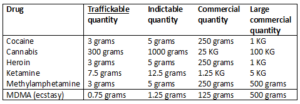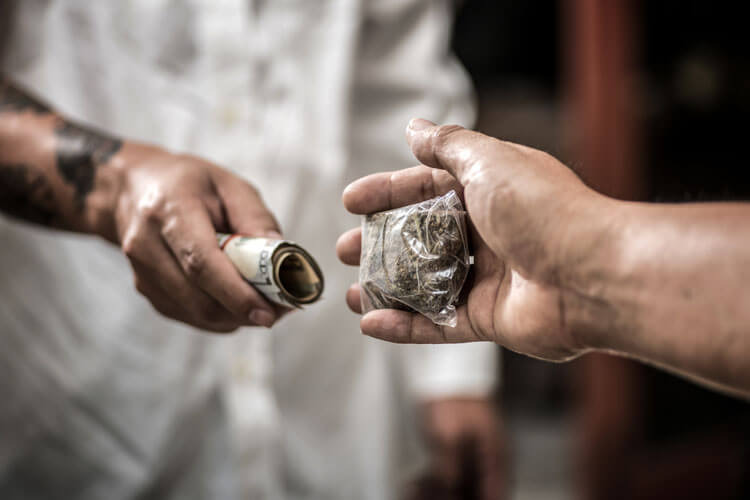What is Deemed Drug Supply?
In New South Wales a person can be charged with drug supply if they are found to be in possession of a prohibited drug, with an amount greater than the “traffickable” quantity. This is because it is “deemed” that the person was in possession of that quantity for the purpose of supply. This is the case even in the absence of any evidence which may suggest that the person was supplying a prohibited drug.
Section 29 of the DMTA provides as follows:
A person who has in his or her possession an amount of a prohibited drug which is not less than the traffickable quantity of the prohibited drug shall, for the purposes of this Division, be deemed to have the prohibited drug in his or her possession for supply, unless:
a) the person proves that he or she had the prohibited drug in his or her possession otherwise than for supply, or
b) except where the prohibited drug is prepared opium, cannabis leaf, cannabis oil, cannabis resin, heroin or 6-monoacetylmorphine or any other acetylated derivatives of morphine, the person proves that he or she obtained possession of the prohibited drug on and in accordance with the prescription of a medical practitioner, nurse practitioner, midwife practitioner, dentist or veterinary practitioner.
The practical effect of Section 29 is that it applies a rebuttable presumption that the accused person was in possession of that quantity of drug for the purpose of supply. Therefore, where a person is charged for deemed drug supply unlike the usual requirement for police to prove the offence beyond a reasonable doubt the onus shifts to the accused person to rebut the presumption. This will involve the accused person proving, on the balance of probabilities, that they were in possession of the drug otherwise than for the purpose of supply.
What must the police prove in a deemed drug supply charge?
Unlike a standard drug supply charge under Section 25 of the DMTA, there is no need for the prosecution to prove that you supplied a drug. There are essentially only two elements which the prosecution must establish for deemed drug supply, namely that:
- the accused was in possession of a prohibited drug;
- that the drug(s) weighed more than the traffickable amount.
What is a prohibited drug?
There is an extensive list of drugs that the law has prohibited in NSW. A comprehensive list can be found in Schedule 1 of the DMTA. The most common prohibited drugs are:
- Cannabis
- Cocaine
- MDMA (Ecstasy)
- Amphetamines
- Ketamine
- Heroin
- LSD
- GHB
What is possession?
The legal definition of possession is construed broadly by the Courts. To prove possession, the prosecution must prove that a prohibited drug was either in the person’s custody (immediate physical possession of the drug) or control (the ability to exercise control over the drug, to the exclusion of all other people with the exception of those people acting jointly with the offender), and that the person knew that they had custody or control over the prohibited drug. However, knowledge alone does not amount to possession. For example, if a person is with an associate who is carrying a prohibited drug, just because the person has knowledge that that the associate is carrying a drug does not make them culpable of possession.
Drugs found in communal areas
When Police locate a drug in a common area such as a living room, kitchen, or bathroom or even a vehicle that is shared by multiple people, in the absence of evidence linking the drugs to a particular person (i.e. DNA or fingerprints), establishing possession will likely fail because the prosecution cannot exclude that the drug belonged to one of the other persons.
What is the traffickable amount?
Schedule 1 of the DMTA sets out a comprehensive list of the traffickable amount of prohibited substances. The most common which come before the Court are:

To be successful in a deemed drug supply prosecution the police will need to prove beyond a reasonable doubt that the accused was in possession of a drug greater than the traffickable quantity, otherwise the deeming provision under section 29 of the DMTA does not apply.
How are the drugs weighed?
A common misconception is that only the weight of the drug in pure form counts. However, the weight of the admixture which is used for the purpose of determining the weight. Therefore, if a person in in possession of 10 grams of a drug, despite the fact that only 25% of it is pure, the relevant quantity will still be 10 grams.
However one very important factor in relation to the weight is where the drugs are weighed in the packaging. Packaging does not form a part of the weight and at times the packaging can increase the weight significantly. Such packaging commonly includes resealable plastic bags and even the capsule shell. It is important for your legal representative to request that police weigh the drugs in a laboratory to get an accurate weight of the drugs.
Rebutting the presumption of Deemed Drug Supply
The onus is on the accused to rebut the presumption of deemed drug supply. The most common way to rebut the presumption is for the accused to prove that they were in possession of the drug for a purpose otherwise than for supply.
The most common answers to this presumption are that the drugs were for personal use, or that the accused was merely holding the drugs for another person with the intention of returning them.
Indicia of Supply
The most important factor that the court will consider in determining whether a person has rebutted the presumption is whether the police were also able to locate any indicia of drug supply (signs or indications of drug supply). Indicia of drug supply includes the following:
- Scales;
- Resealable plastic bags;
- Multiple mobile phones;
- Rubber bands;
- Amounts of cash;
- Weapons.
If the police do find these items, the prosecution will be able to use them in court as evidence that the accused was in possession of prohibited drugs for the purposes of supply.
The offence
Although it is Section 29 of DMTA that allows the police to charge a person with deemed drug supply, the person is nonetheless charged under the regular offence of drug supply that is found in section 25(1) of the DMTA, which states:
A person who supplies, or who knowingly takes part in the supply of, a prohibited drug of an offence.
What is the maximum penalty?
The maximum penalty that may be imposed by the Courts is dependent on the type of prohibited drug and the quantity of the prohibited drug. Generally, the maximum penalty for supplying a prohibited drug in an amount less than the commercial quantity is 15 years imprisonment or 10 years in relation to cannabis plant or cannabis leaf.
Which Court will hear my matter?
This will largely depend upon the quantity of the prohibited drug found in your possession. In 2018 the law was amended to allow quantities which are not greater than the commercial quantity to be heard in the Local Court as opposed to the District Court where the Director of Public Prosecutions did not elect the matter. There are a number of benefits to having a matter heard in the Local Court as opposed to the District Court.
Possible penalties
There are several penalties which the Court can impose on a person who pleads guilty to a charge of deemed supply. This could range from avoiding a conviction all together to a full-time prison sentence. The penalty that will be imposed will greatly depend on the seriousness of the offence.
The seriousness of the offence
In determining the seriousness of the offence, the court will generally consider the following matters:
- The quantity of the drug;
- Whether the offending was planned and sophisticated;
- Whether there was trafficking to a substantial degree;
- Whether a profit was being made;
- The reason(s) for the offending;
- If the supply was a part of the syndicate;
- The role that the offender was holding within the syndicate.
What to do if you are charged with deemed drug supply
It is very important that you get immediate legal advice if you are charged with an offence of deemed drug supply. We have a track record of successfully defending deemed drug supply charges.
Contact the best criminal law firm in Sydney to have your first free legal consultation Our lawyers are ready to take calls 24 hours, 7 days a week. Call us now on 1300SILENT (1300-745-368) or alternatively 0448 142 113 to get immediate legal advice.



